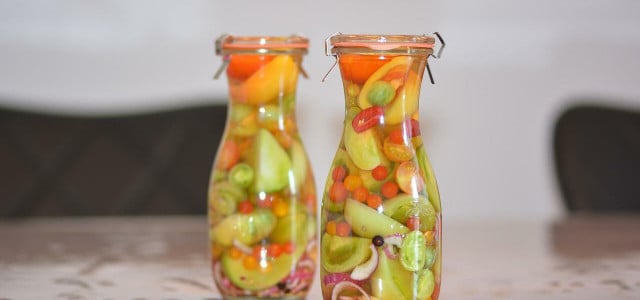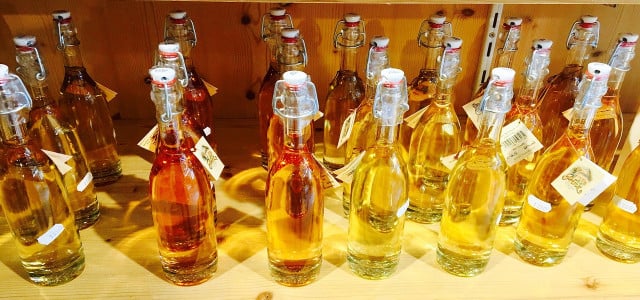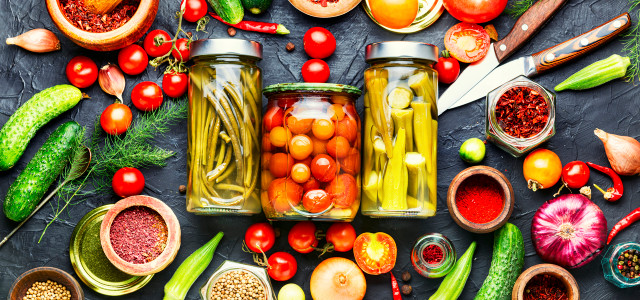Pickling vs fermenting — what’s the difference and does it matter? Find out by reading more about these ancient methods of food preservation and how they might benefit you.
There are similarities and differences when it comes to pickling vs fermenting. Vegetables and animal products are commonly pickled for preservation, texture and taste, while fermentation is widely used in the brewing, baking and wine making industries — even though you can also ferment virtually any vegetable. Understanding a little bit more about each will help you introduce these natural forms of food processing and preservation into your own kitchen.
Pickling vs Fermenting: What Is Pickling?
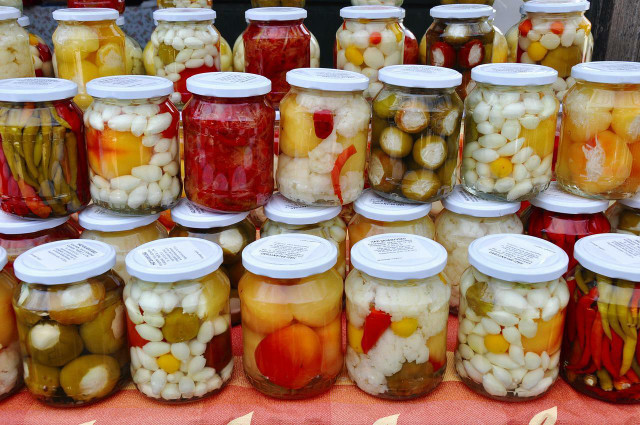
(Foto: CC0 / Pixabay / szjeno09190)
This easy method of food preservation dates back to the early 2000’s BCE in India. Pickling uses an acidic brine to preserve food and results in a sour taste and softened food texture. Acidic brine is a mixture of either salty or sugary water and acidic liquids — typically vinegar or sometimes lemon juice. It is this acidity that kills off microbes and acts as a food preservative.
The mixture is then poured over the food in a sterilized glass jar and sealed. Fermentation can follow if the brine not too acidic — which is why the two processes are commonly confused. Pickling is easy to do at home with a variety of plant-based foods. Pickled cherries are a delicious way of preserving your seasonal favorites for later in the year. Pickled red cabbage makes a tasty ingredient for a range of recipes or even try pickled walnuts at home for a nutrient dense and tangy snack.
Properly pickled (and pasteurized) food can be stored for months on end at room temperature, and won’t need refrigeration until opened.
Pickling vs Fermenting: What Is Fermenting?
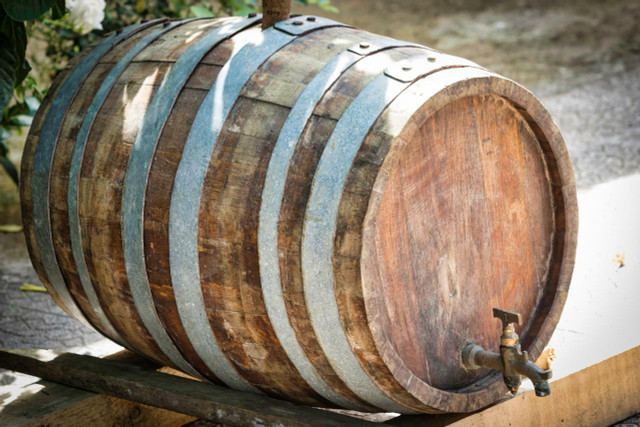


(Foto: CC0 / Pixabay / nicolagiordano)
A fermented food has been preserved and transformed by bacteria without the addition of acidic brine. Evidence of fermenting dates back to as early as 7000 BCE in China. Like pickling, it is also a very simple and effective way to preserve food. There are two types of fermentation — alcoholic and lactic acid — and both work on the same principles.
During fermentation, friendly bacteria in food convert the sugar into other substances, like acids, carbon dioxide, and alcohol. This happens in the absence of an acidic brine; for vegetable fermentation, a salt brine of about one to three percent is usually used. No sugar is added in the brine for fermentation, the bacteria feed on the sugar contained in the vegetables only. These substances that the microbes produce then preserve the food and enhance its flavor. And best of all, fermented foods — like miso paste and tempeh — provide a healthy source of probiotics for you and your gut.
Even fermented beverages like sauerkraut juice and vegan kefir are gaining popularity globally due to their associated health benefits. Fermenting garlic and other plants is an easy and delicious way of improving the diversity of microbes that live in your gut and any menu. You can even ferment mushrooms.
While fermentation happens at room temperature, fermented vegetables need to be placed in a refrigerator to keep, and to stop fermentation. When you see fermented vegetables, like German sauerkraut, in a supermarket shelf, it means that the veggies have been pasteurized and all probiotic bacteria within the food have been killed off — still tastes good, but doesn’t bring the same benefits for gut health as fresh fermented vegetables.
Alcoholic fermentation happens in the production of beer and wine, for example. If you want to make sure you only consume vegan alcohol, check out our guides Is Beer Vegan? What Vegans Need to Know and Why Wine Isn’t Always Vegan.
Pickling vs Fermenting: Which One to Use?
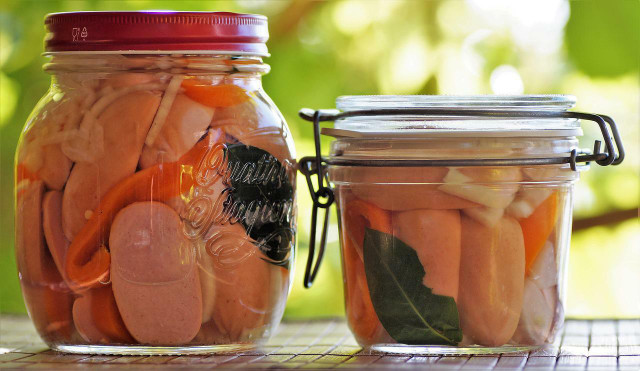


(Foto: CC0 / Pixabay / ivabalk)
Generally, pickled foods don’t hold the same health benefits as fermented because fermentation preserves the nutrients of the original ingredients, makes them more available to our bodies and introduces live cultures to your diet. It is important to complement these probiotics with natural prebiotic foods to keep them and you healthy. Pickling can kill some of the nutrients in food due to the acidic brine but many pickled vegetables are excellent sources of the prebiotics we need.
When it comes to taste, pickled produce brings a sour acidity to a dish, while fermented foods bring salty, sour and a more diverse blends to the palate. Both are excellent at adding an injection of flavor to any meal. So, whether you pickle or ferment, it’s all about what you serve them with and what health benefits you are aiming for.
Pickling vs Fermenting: Why Should We Do Either?
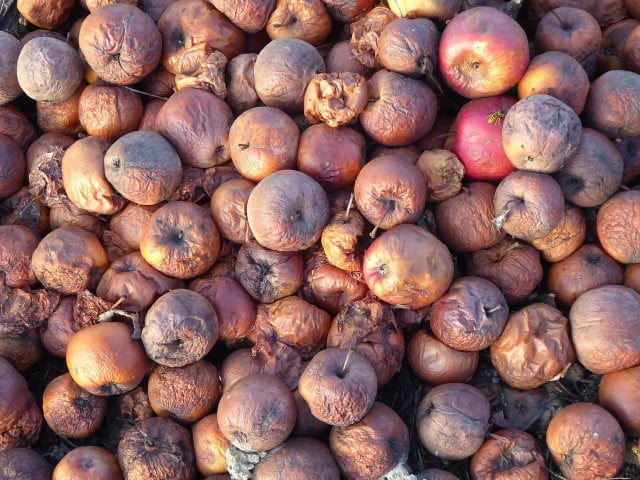


(Foto: CC0 / Pixabay / John-Silver)
When it comes to pickling vs fermentation and the environment — we love them equally! Both have been used to preserve food naturally for thousands of years and originate from times when food was too precious to waste. In the modern day, the Environmental Protection Agency (EPA) continue to raise concerns that one third of our food is never eaten and is the single most common material to be landfilled and incinerated in the U.S.
To deal with the crisis, the EPA has joined forces with the USDA and FDA to create the Winning on Reducing Food Waste Initiative. They issued the Federal Interagency Strategy in April 2019 — which is aimed at educating Americans on the impacts and importance of reducing food loss and waste.
By taking small steps, like learning how to ferment vegetables or how to make homemade pickles, you can contribute too. Natural food preservation methods are easy ways that can help you reduce your food waste and lower your carbon footprint.
Read more:
- Natto Recipe: How to Make the Japanese Fermented Beans
- Can You Freeze Sauerkraut? 7 Tips for Fresh or Canned
- 7 Ways in Which Balsamic Vinegar Is Good for You
Do you like this post?






